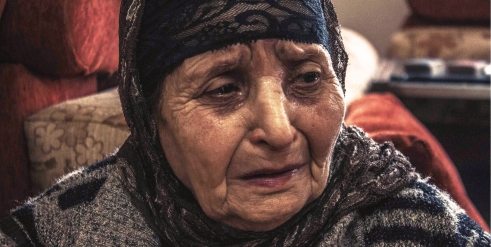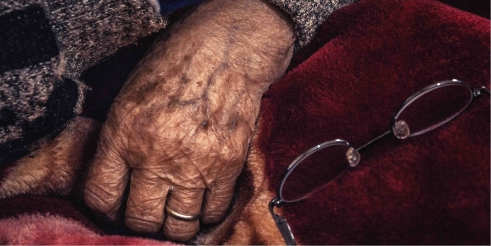by Sarah Gillam

(c) Sandra Kastoun/HelpAge International
Warda is an 85-year-old refugee from Syria living in Tyre, Lebanon
“I know that humanitarian aid might be helping, but only for those who can go and get it. How am I supposed to get this help if I can’t even leave the room?”
Warda, an 85-year-old Syrian woman living in Lebanon, is one of countless older refugees caught up in one of the worst conflicts since the Second World War.
Warda is a former vet who raised her children alone after her husband died 30 years ago. She used to live in Yarmouk refugee camp outside Damascus. When she fled the war in 2012 and arrived in Lebanon where her daughters and sisters live, her family refused to take her in because of her age and poor health. She’s moved from house to house ever since.
“I cry at night and ask God if I can die early. When a person loses their health and the ability to move, they lose everything,” she said.

(c) Sandra Kastoun/HelpAge International
Warda’s husband died 30 years ago and she raised her children on her own
Warda is just one of 300 refugees from Syria, Ukraine and South Sudan interviewed by HelpAge International about their experiences of conflict and emergencies.
Why are older people’s needs being ignored?
A shocking 95% of older people surveyed in Lebanon, 93% in South Sudan and 66% in Ukraine said that no one other than HelpAge had consulted them about their needs, despite many older people being reliant on humanitarian assistance. The findings showed evidence of neglect, poor health provision and feelings of isolation and fear.
Oboch, 86, who lives in a refugee camp in Juba, South Sudan cited similar concerns to Warda: “We’re always being filmed and photographed but nothing changes. We know humanitarian organisations can’t leave people to die of hunger, but why is there not enough food?”
An 85-year-old woman from the South Sudan put it clearly: “No one talks to me to find out what I’m going through.”
In eastern Ukraine, humanitarian aid was a lifeline during the blockade, said Anatoly, 89.
“For nine months, we had no pension and many people simply starved. I don’t know how we would have survived without aid,” he added.
Lack of information about humanitarian assistance
More than two-thirds of older refugees in HelpAge’s report Older voices in humanitarian crises (1.17kb) said they did not have enough information about the humanitarian assistance available to them. Almost half said health services did not provide care for their age-related conditions, and a similar figure said they felt anxious, hopeless or depressed most or all of the time.
The survey findings contribute to a growing body of evidence illustrating the failure of the humanitarian system to protect older people’s rights or meet their needs. The stories highlight the limited progress the humanitarian system has made to address the neglect of older people and other vulnerable groups.
How can the World Humanitarian Summit help #ReShapeAid for older men and women?
The first-ever World Humanitarian Summit provides a chance to lay the foundations for a reformed humanitarian system – one that puts people at the centre of disaster response, builds resilience to crises and really does ensure that we “leave no one behind”.
Leading humanitarian agencies have drawn up an Inclusion Charter setting out the pressing commitments needed to ensure humanitarian assistance reaches the most affected people.
“To address the neglect faced by older people in conflicts and disasters, their opinions must be heard and changes made in the humanitarian system,” said Frances Stevenson, head of the humanitarian team at HelpAge International.
The commitments outlined in the charter provide governments, donors and humanitarians agencies with a set of five key actions to ensure humanitarian assistance reaches the most affected people in emergencies.
To sign up to the charter go to: www.inclusioncharter.org
